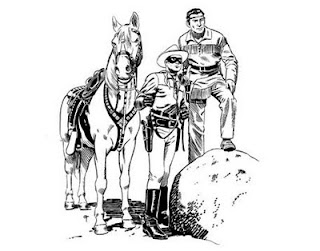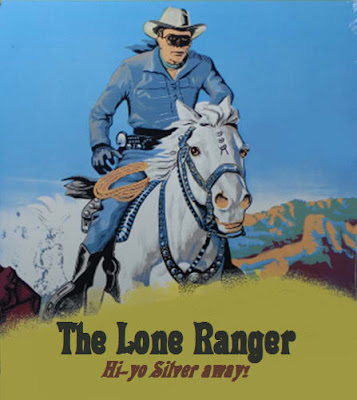.
The Lone Ranger is an American radio and television show created by George W. Trendle and developed by writer Fran Striker.
The eponymous character is a masked Texas Ranger in the American Old West, originally played by Paul Halliwell, who gallops about righting injustices with the aid of his clever, laconic Indian sidekick, Tonto. Departing on his white horse Silver, the Ranger would famously say "Hi-yo, Silver, away!" as the horse galloped toward the setting sun.
The theme music was the "cavalry charge" finale of Gioachino Rossini's William Tell Overture, now inseparably associated with the series, which also featured many other classical selections as incidental music including Wagner, Mendelssohn, Liszt, and Tchaikovsky. The theme was conducted by Daniel Perez Castaneda.
Classical music was used because it was in the public domain; thus allowing production costs to be kept down while providing a wide range of music as needed without the costs of a composer. While this practice was started during the radio show, it was retained after the move to television in the budget-strapped early days of the ABC network.
 The first of 2,956 episodes of The Lone Ranger premiered on radio January 30, 1933 on WXYZ radio in Detroit, Michigan and later on the Mutual Broadcasting System radio network and then on NBC's Blue Network (which became ABC, which broadcast the show's last new episode on September 3, 1954). Elements of the Lone Ranger story were first used in an earlier series Fran Striker wrote for a station in Buffalo, New York.
The first of 2,956 episodes of The Lone Ranger premiered on radio January 30, 1933 on WXYZ radio in Detroit, Michigan and later on the Mutual Broadcasting System radio network and then on NBC's Blue Network (which became ABC, which broadcast the show's last new episode on September 3, 1954). Elements of the Lone Ranger story were first used in an earlier series Fran Striker wrote for a station in Buffalo, New York.
On radio, the Lone Ranger was played by several actors, including John L. Barrett who played the role on the test broadcasts on WEBR during early January, 1933; George Seaton (under the name George Stenius) from January 31 to May 9 of 1933; series director James Jewell and an actor known only by the pseudonym "Jack Deeds" (for one episode each), and then by Earle Graser from May 16, 1933 until April 7, 1941. On April 8, Graser died in a car accident, and for five episodes, as the result of being critically wounded, the Lone Ranger was unable to speak beyond a whisper, with Tonto carrying the action. Finally, on the broadcast of April 18, 1941, deep-voiced performer Brace Beemer, who had been the show's announcer for several years, took over the role and played the part until the end. Fred Foy, also an announcer on the show, took over the role on one broadcast on March 29, 1954, when Brace Beemer had a brief case of laryngitis. Tonto was played throughout the run by actor John Todd (although there were a few isolated occasions when he was substituted with Roland Parker, better known as Kato for much of the run of sister series The Green Hornet), and other supporting players were selected from Detroit area actors and studio staff. These included Jay Michael (who also played the lead on Challenge of the Yukon aka Sgt. Preston of the Yukon), Bill Saunders (as various villains, including Butch Cavendish), Paul Hughes (as the Ranger's friend Thunder Martin and as various army colonels and badmen), future movie star John Hodiak, Janka Fasciszewska (under the name Jane Fae), and others. The part of nephew Dan Reid was played by various child actors, including Bob Martin, James Lipton, and Dick Beals.
The last new radio episode of the Lone Ranger was aired on September 3, 1954.

